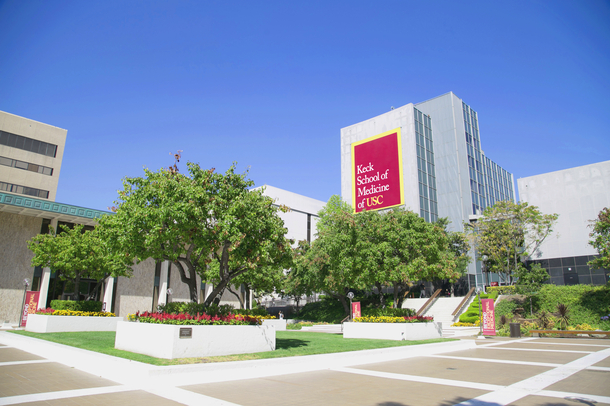
Keck School of Medicine of USC (Photo/Ricardo Carrasco III)
The Donald E. and Delia B. Baxter Foundation is supporting researchers exploring the causes of pediatric blindness and intellectual disability research by granting $100,000 awards to two assistant professors at the Keck School of Medicine of USC: Giorgia Quadrato, PhD, and Aaron Nagiel, MD, PhD.
Quadrato, assistant professor of stem cell biology and regenerative medicine at the Keck School, will use her award to investigate the role of a gene — called SYNGAP 1 — in human brain development. The gene is associated with intellectual disabilities, a condition with enormous public health significance, but with few treatments and little understanding of underlying causes.
To study intellectual disability, researchers have traditionally used mouse models, but it’s hard to see the effects of intellectual disabilities in mice. “These are really human-specific disorders,” Quadrato explained.
That’s why she created new methods to culture three-dimensional human brain organoids that can be generated from induced pluripotent stem cells derived from patient skin samples. Brain organoids mimic aspects of the structure and neuronal composition of the developing human brain, thus offering an unprecedented opportunity to turn back the development clock and watch how the brain and disease come to be.
“The long-term goal is to identify which cell types are affected by gene mutations,” she said. “And when we know, we can design therapies that are targeted for those cell types.”
Nagiel, assistant professor of ophthalmology at the Keck School, is a pediatric retina surgeon who treats patients with blinding eye diseases. He has long had an interest in synapses, and now, to model and treat blindness that stems from receptors and synapses.
His project also uses organoids — to understand how the retina develops and to test treatments for individual patients in cell culture before deploying them in people. He starts with stem cells and grows them in culture, where the cells form multi-layered tissue that looks like retina.
“The retinal organoids are human tissue, so they’re on the same clock roughly as a human fetus,” Nagiel said, explaining that his lab grows them for nine months to understand retinal development.
The system makes it possible to test a treatment in a personalized way before delivering it surgically, he added.
“That’s the power of this system — it can be so personalized,” he said. “Whether this approach will be feasible and scalable, we don’t know, but that’s where medicine is going.”
Jane Haake Russell, president of the Baxter Foundation, added: “The work Dr. Georgia Quadrato and Dr. Aaron Nagiel are doing has the potential to change health care for the better. We are happy to support young scientists who are exploring new ways of approaching intractable problems.”
— Katharine Gammon